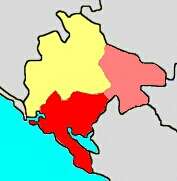Languages of Montenegro
| Languages of Montenegro | |
|---|---|
| Official languages | Montenegrin |
| Minority languages | Albanian, Bosnian, Croatian, Serbian |
| Sign languages | Yugoslav Sign Language |
Montenegro has one official language, specified in the Constitution of 2007 as Montenegrin. At the 2011 census, 42% of the population declared Serbian to be their native language, while 37% declared it to be Montenegrin. Linguistically, they are the same language (different standardized varieties of Serbo-Croatian), but an incipient Montenegrin standard is in the process of being formulated.
Recognized minority languages are Albanian, Bosnian, and Croatian. As of 2017, Albanian is an official language of the municipalities of Podgorica, Ulcinj, Bar, Pljevlja, Rozaje and Tuzi.[1] Additionally, there are a few hundred Italians in Montenegro, concentrated in the Bay of Kotor (Cattaro).
The Montenegrin language is written in Latin and Cyrillic alphabets, but there it is a growing political movement to use only the Latin alphabet.
Minority languages of Montenegro

The European Charter for Regional or Minority Languages entered into force in Montenegro in June 2006, following the independence of Montenegro from the State Union of Serbia and Montenegro on 3 June 2006.[2] The Constitution of Montenegro from 2007 states that Montenegrin is the official language of country, while Bosnian, Croatian, Serbian and Albanian are languages in official use.[3] The Constitution states that languages in official use are those of groups that form at least 1% of the population of Montenegro, as per the 2003 population census.[3] The Law on National Minorities specifies that the percentage of members of national minorities in total population of the local government should be 15% in order for their language and script to be introduced in official use.[4] Media founded by the Montenegro government are obliged to broadcast news, cultural, educational, sports and entertainment programs in minority languages.[4] Minorities and their members have the right to education in their language in regular and vocational education.[4]
Dialects
| Map | Dialect | |
|---|---|---|
 |
Eastern Herzegovinian | |
| Zeta-Raška | ||
See also
| Wikimedia Commons has media related to Languages of Montenegro. |
References
- ↑ http://www.ocnal.com/2017/03/albanian-language-official-in-montenegro.html
- ↑ "Minority languages in Montenegro: new evaluation report released". Council of Europe. Retrieved 26 June 2015.
- 1 2 "Montenegro's Minorities in the Tangles of Citizenship, Participation, and Access to Rights" (PDF). Journal on Ethnopolitics and Minority Issues in Europe. Retrieved 26 June 2015.
- 1 2 3 "Manjine u Crnoj Gori zakonodavstvo i praksa" (PDF). Youth Initiative for Human Rights. Retrieved 26 June 2015.
